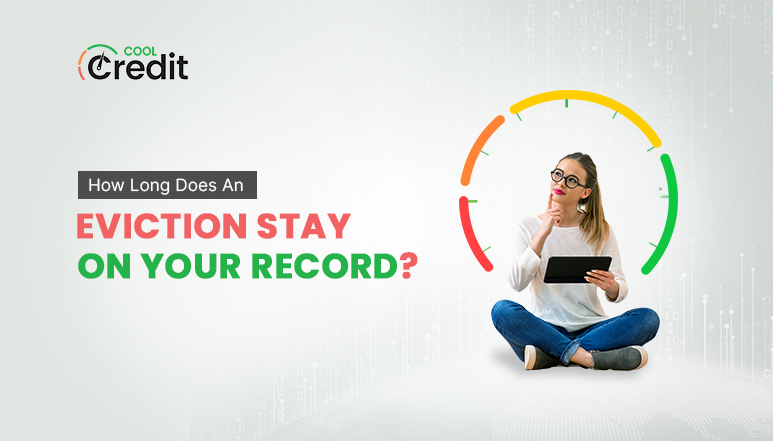
How Long Does An Eviction Stay On Your Record And How Bad Is It?
Eviction does not only impact your life but can also affect your credit score. In this blog, we'll discuss how eviction is reflected in your credit report and answer the dreaded question: "How long does an eviction stay on your record?"
And don't worry, even if you're evicted due to unprecedented and understandable circumstances, you can bounce back and rebuild both your trust with landlords and your credit score.
Swipe to Credit Success with
CoolCredit AI Credit Repair
Does An Eviction Show On Your Credit Report?
Eviction typically does not appear in your credit report. However, overdue rent or defaulted mortgage may be reflected. Moreover, if your landlord sends the debt to collections, the collections account may appear on your credit report. All of these denote what we call derogatory remarks, and can directly impact your credit score by taking it down by significant points.
Besides this, the details of your eviction can be found in a separate rental history report, which can be obtained through a tenant screening company.
Why Would You Even Get Evicted?
While reasons may vary based on several factors like the state you reside in, the most common reasons usually are as follow:
- Rent Default
- Significant harm to the property
- Violation of lease terms (illegal subletting etc.)
- Unlawful activities on the premises
- Extended your stay on the property after your lease has expired
Now, you should know that eviction is a legal process, so either of these will typically show up in your public records. However, when we talk specifically about your credit report, rent default, collection account or a civil judgment is most likely to be added as a derogatory remark on it. Nonetheless, it is important to note that lenders also consider your public records while assessing your creditworthiness, so eviction will directly or indirectly affect it.
How Long Does An Eviction Stay On Your Record?
Now that you know how an eviction is reflected on your credit report, let's get to the answer to the most sought-after question: "How long does an eviction stay on your record?" Well, the exact duration that an eviction stays on your credit report can vary based on several factors, including the credit reporting agency and local laws. Typically, negative information, including evictions, remains on your credit report for seven years. However, the impact on your credit score may retrogress over time.
Nonetheless, let's go over the top reasons for eviction, how long does an eviction stay on your record based on each, and how they're reported.
| Reason for Eviction | Duration on Credit Report | Form of Reporting |
| Unpaid Rent or Lease Violation | Up to 7 Years | Account may be reported as a derogatory item, possibly affecting credit score. Late payment may be indicated. |
| Court-Ordered Eviction | Up to 7 Years | The eviction judgment may be reported, impacting credit score and indicating non-compliance with lease terms. |
| Breaking Lease Terms | Up to 7 Years | Lease violation or breach may be reported, potentially affecting credit score and signaling non-compliance. |
| Abandonment or Surrender of Property | Up to 7 Years | If there’s unpaid rent or damage, it may be reported similarly to unpaid rent, affecting credit score and indicating financial responsibility. |
Does Getting Evicted Hurt Your Credit?
Facing eviction in itself might not hurt your credit. However, if eviction-related activity appears on your credit report, it can take a toll on it. Additionally, there are various ways an eviction might affect your credit and your housing opportunities,, let's go over a few of them:
- More likely than not, your landlord will take legal action to evict you. This naturally means there will be a court judgment involved and that makes eviction a matter of public record, which, in turn, means it'll also be recorded on your credit report.
- A record of the eviction, especially one that involves a court judgment, is likely to appear on your credit report. Resultantly, it can negatively impact your credit score, taking it down by considerable points.
- That said, a derogatory mark like eviction on your credit card is not good news, and the price is credit score points. However, the severity of the impact depends on various factors, including the overall health of your credit history.
- As a repercussion, a history of eviction on your credit report may make it more difficult for you to secure housing in the future. This is because landlords often check credit reports as part of the rental application process. And an eviction record may be a red flag for them.
Scenario-Based Impact Of Eviction On Credit Score
| Scenario | Potential Impact on Credit Score |
| Unpaid Rent Reported | Moderate to Significant |
| Collections Account Due to Unpaid Rent | Significant |
| Court Judgment for Unpaid Rent | Substantial |
How Long Does Bad Rental History Stay On Your Record?
Typically, bad rental history, including evictions or late payments, stays on your record for seven years. However, the duration can vary based on several influencing factors, including:
- Regional variations
- Reporting agencies
- Tenant screening services
Further, it's imperative to regularly monitor your rental history report for accuracy and address issues promptly. Also, despite having a bad rental history, you can still build trust with landlords and secure housing opportunities. However, it can only be done if you develop and demonstrate positive rental behavior, like timely payments.
Can You Rent With An Eviction On Your Record?
A bad rental history may be a result of unprecedented circumstances or financial distress. Given the genuineness of your situation, landlords may give you a benefit of doubt and consider you as a tenant. However, it is imperative to earn their trust first. If you're puzzled by the question, 'How to rent with an eviction on your record', here are a few things to keep in mind:
- Be honest and upfront about your eviction history. Trying to hide the issue will only accentuate it as a red flag.
- Have people vouch for you. Provide references of people, possibly previous homeowners. This will help prove your trustworthiness.
- A co-signer with a good rental history can help your cause. So, try to get one on board.
- Most importantly, explain why you were evicted and the circumstances that led to it. Landlords may empathize with you and give you a second chance.
- Another way to reassure your landlord of your ability to pay rent is to provide proof of income.
| Note: The availability of these options can vary depending on local laws and individual landlords' policies. However, it's worth the shot. |
Can You Dispute An Eviction With The Credit Bureaus?
Only if it was wrongfully reported, which in most cases, is unlikely. Moreover, evictions aren't directly reported to credit bureaus; however, reasons behind the eviction, i.e., unpaid rent or judgments resulting from eviction proceedings, may be reported. If you find any of these items on your credit report, entered as an error, you can dispute them.
| Send AI-generated evidence-based dispute letters to bureaus using CoolCredit. |
What Should You Do If A Civil Judgment From An Eviction Is On Your Credit Report?
In most cases, it takes up to seven years for a derogatory mark like a civil judgment from an eviction to be removed from your credit report. However, here are a few steps to follow to deal with it:
- Firstly, retrieve your credit report from all three bureaus to check for accuracy. You can do so using the ai credit repair app, CoolCredit.
- In case you notice any errors in the report or any inaccurate items, dispute them.
- Now, in case, the item is there justly, negotiate with the creditor for a settlement or payment plan to redeem yourself and set the record straight.
- If at all it is feasible, pay the judgment in full.
- Further, request for removal or adjustment after resolving the issue and following the judgment.
- Let time take its course and be patient for the judgment to naturally fall off.
Rest assured, even if the civil judgment from an eviction is on your credit report, you can regain the trust of landlords over time. Further, the impact of the derogatory mark on your credit score will diminish. That is if you build a positive repayment history and prove yourself as a reliable tenant.
How To Avoid Eviction To Begin With
Rather than dealing with the aftermath of an eviction on your credit score, and life, it's best to find ways to avoid it. Here are a few tips to keep off the top of your head:
- Communicate early with your landlord about financial difficulties.
- Understand and adhere to lease terms, including payment deadlines.
- Create and stick to a budget prioritizing rent.
- Build an emergency fund for unexpected expenses.
- Explore local financial assistance programs.
- Negotiate with your landlord for temporary solutions or payment plans.
- Know and assert your tenant rights.
- Keep records of all communications and financial arrangements.
- Seek temporary housing solutions during financial challenges.
- Utilize mediation services to find mutually acceptable resolutions.
- Consider legal advice if eviction is imminent.
Rebuild Credit Score Despite Eviction On Your Record With CoolCredit
Eviction in itself is a challenge big enough to be stressing over its impact on your credit score. While you regain landlords' trust by being honest and demonstrating your reliability and responsibility, CoolCredit can help you regain control of your credit-rebuilding journey.
- Retrieve and review credit reports from all three bureaus to gain better insight into your credit journey.
- Look out for any inaccuracies and identify the scope of improvement to fast-track your credit-rebuilding process.
- Generate evidence-based dispute letters to dispute inaccuracies and take prompt action to improve your credit history.
- Access all the tools and tactics you need to rebuild your credit score.
- Track your credit progress and refine your approach as and when needed.
- Get Expert Assistance if you find yourself in a predicament.
Conclusion
While eviction itself may not directly be reflected on your credit report, it can impact your credit score through associated factors like overdue rent, debt sent to collections, or a civil judgment. And how long does an eviction stay on your record? Typically, 7 years, however, its impact on your credit score diminishes over time. Regardless, there are ways to rebuild trust with landlords and your credit score over time.
Frequently Asked Questions
Q: How Long Does Bad Rental History Stay On Your Record?
A: Typically, negative information, like bad rental history, can stay on your record for seven years.
Q: How To Rent With An Eviction On Your Record?
A: Renting with an eviction on your record can be quite a task, but don't lose hope. With the right approach and attitude, you can rent a house even with eviction on your record. Here's what to do:
- Be honest and disclose your eviction upfront
- Explain any circumstances that led to it
- Provide strong personal and professional references
- Consider having a co-signer with a reliable rental history
Q: How Long Does It Take For An Eviction To Show Up?
A: The time it takes for an eviction to appear on your credit report varies, but it typically takes several months from the initiation of legal proceedings. However, once the eviction is finalized, reporting to credit bureaus may happen relatively quickly or take several weeks.
Q: Do Evictions Show On Background Checks?
A: Yes, evictions can show up on background checks, specifically on rental history reports.
Q: Does Getting Evicted Hurt Your Credit?
A: The eviction itself may not directly impact your credit score, but potential reasons behind it, such as unpaid rent or other associated debts may.
Q: Do Evictions Show Up In Other States?
A: Considering evictions are a matter of public record, some databases may track information pertaining to it across states.
Q: How To Get An Eviction Off Your Record?
A: Evictions themselves are not directly reported to credit bureaus, but associated factors, such as unpaid rent or judgments from eviction proceedings, may be reported. Typically, these derogatory remarks are removed from your record after 7 years by default. However, if the marks related to an eviction are wrongfully reported, you can dispute them.
Q: How Do I Find Out If I Have An Eviction On My Record For Free?
A: For a Free Eviction Check, simply retrieve your credit reports from all three bureaus and check it thoroughly. You can also do the same with the help of a DIY credit repair app like CoolCredit.





